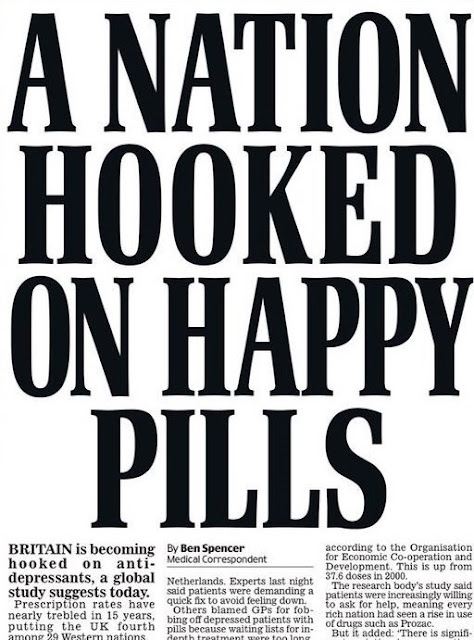Responding to Stigma: “A Nation Hooked on Happy Pills.”
The Daily Mail recently published an article with the
headline “A Nation Hooked on Happy Pills”. This is dangerously wrong for so
many reasons and shows how far we still have to go in the fight against mental
health stigma and misinformation. So, I thought I would respond by giving a
brief explanation of why exactly this headline is insensitive and harmful.
1. This shows that mental illnesses aren’t taken as
seriously as physical illnesses.
Reporting on mental health problems by blaming prescriptions is apparently fine but we would never blame inhalers for a rise of asthma diagnoses. This
shows how differently we think about mental illnesses and physical illnesses
and although they are different (for example, the mind perceives everything so
mental illnesses often effect every aspect of life, whereas a kidney infection
effects the kidney and its specific functions), they are not any less important
which this headline implies.“No one would ever say that someone with a broken arm or a broken leg is less than a whole person, but people say that or imply that all the time about people with mental illness.”
― Elyn R. Saks
2. It spreads the myth that happiness is the opposite of mental illness.
People who have depression or any other mental illness aren’t trying to be
happy. Or at least no more than everyone else. We don’t go to the doctor
expecting some happy pill to fix all of our problems and make us happy. We want
to be well, because we have a mental illness. We want to be treated, because we are ill. We want our mental illness to be
treated like an illness instead of a personality flaw, because mental illnesses
are illnesses. It’s really not that difficult.
The opposite of mental illness isn’t happiness, it’s wellness.
The opposite of mental illness isn’t happiness, it’s wellness.
3. It somehow manages to make the increase of people getting medical help for their medical condition sound like a bad thing.
And as a result this deters people from seeking help when they need it or it
may cause people to stop their treatment with or without informing their
doctor, which can have terrible consequences. It may seem like I’m being
dramatic but when you really think about it, this headline alone could a
breakdown of several people’s mental and physical health. It’s sad to think
that the latter may be the only reason why people think this headline is so
wrong.
Thousands of people die every week from undiagnosed mental health problems. Mental health problems are not over diagnosed and spreading that misinformation is adding to the problem.
Thousands of people die every week from undiagnosed mental health problems. Mental health problems are not over diagnosed and spreading that misinformation is adding to the problem.
4. It adds to the stigma which already surrounds taking medication for mental illnesses.
A lot of people do not take medication for their mental illness, which is totally fine, there are many other options available for treatment, but if the reason is because you are ashamed, because of ignorant and idiotic comments like the one made by The Daily Mail, then that is a problem. Everyone is different and different things work for different people but comments like these made by people with a complete lack of understanding prevent so many people from even trying and therefore potentially compromises their recovery.
5. It glamorises and sensationalises mental illnesses.
Using colloquialisms like ‘happy pills’ for anti-depressants, ‘cocktail’
of drugs for an overdose and ‘shrink’ for psychiatrist is unprofessional,
offensive and extremely reductive. Again, it spreads the idea that mental
illnesses aren’t as serious as physical illnesses. Again, it discourages people
from seeking help by making them feel like they’re not deserving of help, that
they’re not ‘sick’ enough because their illness is in their brain, as if one
organ is more deserving of sympathy and help than another.Trying to manage a mental illness is difficult enough without being surrounded by stigma, misinformation, glamorisation and ignorance.
“I'll say it again - mental illness is a physical illness. You wouldn't
consider going up to someone suffering from Alzheimers to yell, "Come on,
get with it, you remember where you left your keys?" Let us shout it from
the rooftops until everyone gets the message; depression has and nothing to do
with having a bad day or being sad, it's a killer if not taken seriously.”
― Ruby Wax
― Ruby Wax
If you liked this post, you may also like:
1. Responding to Stigma: “Addiction is a Choice”
2. Am I Faking My Mental Illness?
3. Mental Illness in Fiction
1. Responding to Stigma: “Addiction is a Choice”
2. Am I Faking My Mental Illness?
3. Mental Illness in Fiction



Wow Amber, what a well expressed defense of good sense and compassion. I do not take medication for my mental health needs but I support this thatchose to. You are so right in your breakdown of this articles stigmatization and misrepresentation of medicine for mental health. Thank you.
ReplyDeleteThank you so much for your support!
Delete